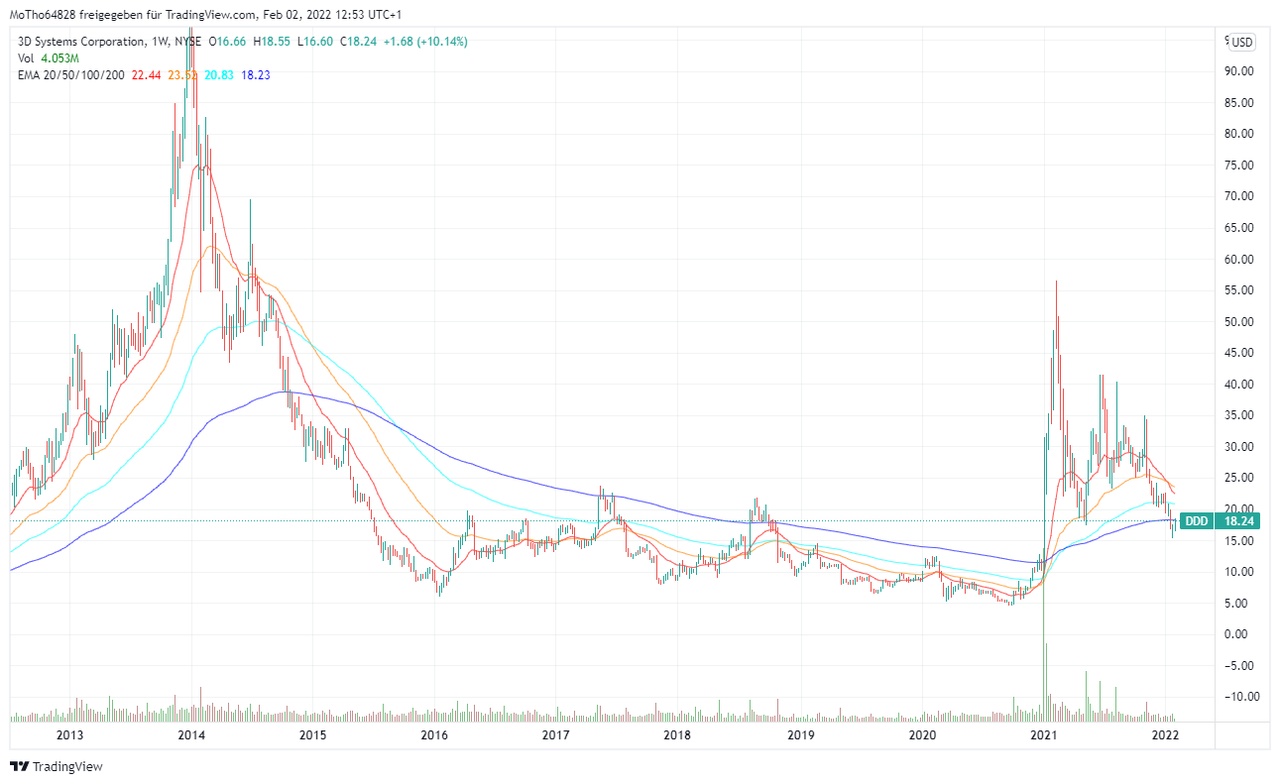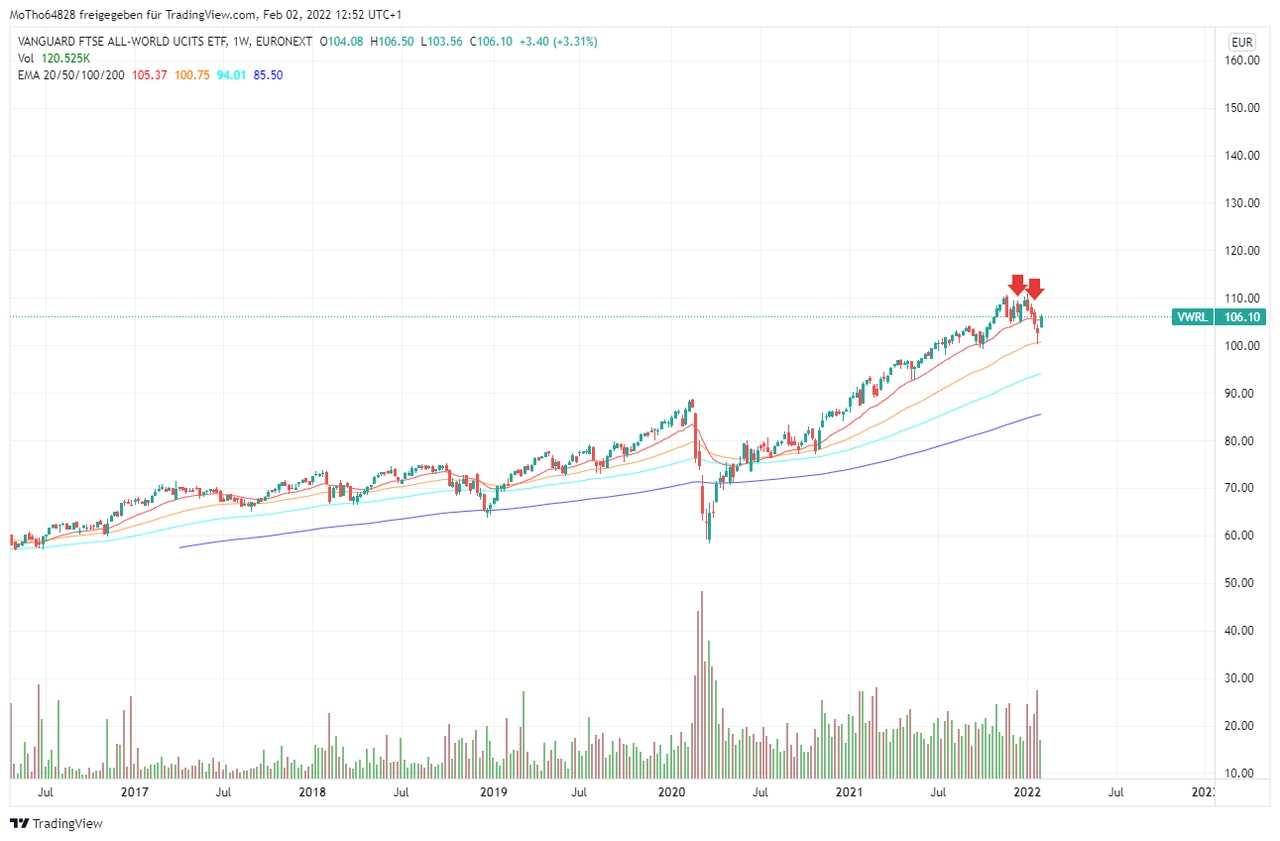𝑼𝒏𝒑𝒐𝒑𝒖𝒍𝒂𝒓 𝑶𝒑𝒊𝒏𝒊𝒐𝒏 𝒛𝒖 𝑺𝒑𝒂𝒓𝒑𝒍ä𝒏𝒆𝒏
Why the basic idea is good, but I cannot understand different variations
----------------------------------------------------------------------------------------------
1) Basic concept and why it would make sense if used as stated.
2) savings plans on shares
3) short-term savings plans
4) Savings plans During EXECUTION change
----------------------------------------------------------------------------------------------
1) 𝑫𝒊𝒆 𝒍𝒂𝒏𝒈𝒘𝒆𝒊𝒍𝒊𝒈𝒆 𝒂𝒃𝒆𝒓 𝒔𝒊𝒏𝒏𝒗𝒐𝒍𝒍𝒆 𝑮𝒓𝒖𝒏𝒅𝒊𝒅𝒆𝒆.
World ETFs rise over the long term. As long as our economic system is built on growth, it will stay that way.
Long term here means =/> 8 years. This works, among other things, because companies gain more in value than others (that go bankrupt) are worth.
Therefore, a savings plan on a world ETF makes a lot of sense, because in the long term the prices are higher than the purchase value and timing is difficult.
2) 𝑺𝒑𝒂𝒓𝒑𝒍ä𝒏𝒆 𝒂𝒖𝒇 𝑨𝒌𝒕𝒊𝒆𝒏
Provided one takes the significantly higher risk and invests in individual companies.
Do savings plans then still serve the purpose of achieving an average entry point? Yes.
Just as with the ETF, does anything prove that this stock will go up in the long run, so does an average entry point bring you anything?? NO.
Does it therefore make sense to buy batches at random times ? Nope.
What do I get out of a permanent savings plan on something of which I do not know whether it will bring me long-term returns?
Everybody knows the 2 statistics
I : Market timing does not work better than buy and hold (for a large part of investors)
II : Stock picking does not work better than the broad market (for a large part of investors)
So if you buy individual stocks, you assume against the statistical average probability that you are better at the big game of the stock market than many others.
Nevertheless, some then decide to let good buying opportunities pass in favor of monthly fixed buying times.
Even without TA knowledge or the like; buying when prices are cheaper and waiting when prices are expensive (at ATH) is the only way to make money with individual stocks even over bear phases.
Then beating the market is one thing, but over 20 or more years to find the few stocks that always beat the market on average over time (= run savings plan on these stocks), is an even more difficult task.
No strategy makes sense anymore if savings plans are used; for example the deep value strategy of Charles Munger is completely invalid, as it says that you buy when prices are falling, if the intrinsic value is higher.
Single stock strategy = timing.
So why use it? Either one invests passively with little risk or one invests actively, to invest passively is perhaps not so bad in Bull times, but in every other case simply only gambling.
An investment does not become less risky if one follows the statistical recommendations partly observed.
Conclusion: Actually nonsensical, if you are too impatient to wait for opportunities and always have to keep your money in some stock, you should not create a savings plan (then you actually have nothing lost in investments in individual stocks).
3) At this point, nothing is really rational anymore:
𝑺𝒑𝒂𝒓𝒑𝒍ä𝒏𝒆 𝒊𝒏 𝒆𝒊𝒏𝒆𝒎 𝒌𝒖𝒓𝒛𝒇𝒓𝒊𝒔𝒕𝒊𝒈𝒆𝒏 𝒁𝒆𝒊𝒕𝒓𝒂𝒖𝒎 𝒍𝒂𝒖𝒇𝒆𝒏 𝒍𝒂𝒔𝒔𝒆𝒏. (Or in addition to savings plans re-buying, partial selling, etc).
I already find savings plans on shares pointless, but if they are then only executed in the short term (3 months, 1 year, something like that), I no longer even understand the original basic thesis?
The intention of savings plans should be first of all the avoidance of market timing, by savings plans that only last a short time or only fill a certain position size, you don't achieve EXACTLY THAT!
Definition of successful market timing: the attempt to achieve above-average profits by purchasing at a subjectively selected point in time.
Let's say a stock goes public in 2010. It is bought out again in 2050 and taken off the stock market. I bought in 2 batches 2020 and 2021, Max had a savings plan going for 10 months in 2020.
Both equally: Market timing.
The short and medium term average does not have to be advantageous for the investor in the end for shares in any case.
So if you run a savings plan only temporarily, you yourself recognize that it makes sense to time the market, but do not really want to admit it? Or how?
Some had even in the 2021 Bullrun savings plans run, the positions now run into the minus and it is no longer re-bought.
Because the "positions are now full".
4) 𝑾ä𝒉𝒓𝒆𝒏𝒅 𝒅𝒆𝒓 𝒃𝒆𝒈𝒓𝒆𝒏𝒛𝒕𝒆𝒏 𝑳𝒂𝒖𝒇𝒛𝒆𝒊𝒕𝒆𝒔 𝒆𝒊𝒏𝒆𝒔 𝑺𝒑𝒂𝒓𝒑𝒍𝒂𝒏𝒔 𝒅𝒊𝒆𝒔𝒆𝒏 𝒗𝒆𝒓ä𝒏𝒅𝒆𝒓𝒏. 𝑶𝒅𝒆𝒓 "𝒇𝒓ü𝒉𝒛𝒆𝒊𝒕𝒊𝒈 𝒔𝒄𝒉𝒍𝒊𝒆ß𝒆𝒏"
Now let's see that in point 4) everything from 2) and 3) is true.
If you plan to save on a stock (for whatever reason) with a time-limited savings plan (for whatever reason) and then cancel the whole thing, for example, after a price drop...
Is the savings plan then used for anything other than avoiding the purchase fees?
𝑭𝒂𝒛𝒊𝒕, if you have other arguments feel free to post in the comments:
Savings plan on World ETFs for low risk ✅
Savings plans on shares ❌
#learn
#opinion
#personalstrategy





















